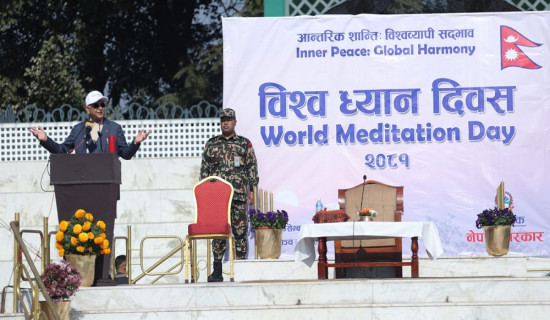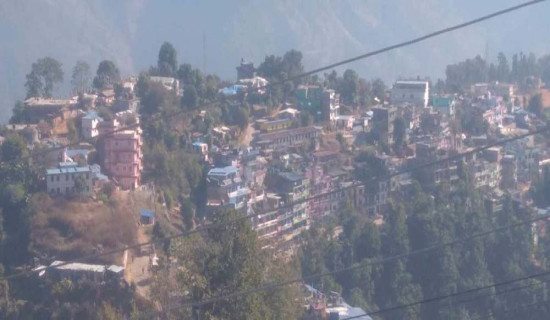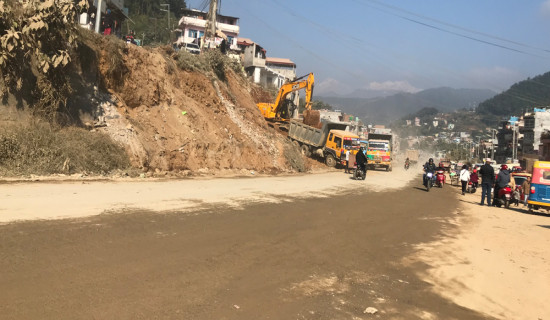- Saturday, 21 December 2024
Action Matters More Than Words
If there is one thing we lack for development in Nepal, it is quality tasks in any field – education, health, administration, management, development, and governance. We often talk about the quality of things we do, but the evidence shows the practice is contrary. Things that happen do not usually happen to the full satisfaction of the stakeholders. There is indeed a huge gap between our plans and actions. One grave question in contemporary Nepali society is why we have not been able to practice what we have aimed for.
Critics say the plans are appropriate, but the actors involved in the activities are insincere. That may be true, but it is not the whole truth. There are two things for quality assurance in any task – what we plan to do and how we perform the defined action. Whereas the first relates to content, the second concerns method. What critics often say about the actor's sincerity is an angry reaction towards the persons involved in defined tasks, an ad hominem criticism directed against the person, not what the person is supposed to do.
Blueprint mapping
The literal meaning of a blueprint is a piece of blue paper with a design for building something printed on it. This meaning has now been extended to the systematic plan for doing something for a community or the nation. The process of making blueprints has now been institutionalised in almost all nations. The Planning Commission of a country is such an example. Nepal is one of these countries that instituted the National Planning Commission in 2013 BS, which has made 16 different periodic plans of three and five years. It is assumed that the Government of Nepal makes the budget plan each year based on the periodic plan and presents it to the parliament for elaborate discussion and resolution to make it mandatory for the cabinet to follow. In this sense, NPC is a cornerstone for making perfect plans for the overall development of Nepal.
NPC consist of a Vice Chairman with other members who are supposed to have excelled in their fields. So, it is valid to assume that they contribute to making perfect periodic plans for development. In most cases, NPC has demonstrated its capacity to make contextual blueprints. But in many cases, the implementation body does not follow the blueprint of the NPC in this or that pretext. The most common excuse is the lack of adequate finance. This used to be a convincing cause of lagging in the remote past. But in recent days, this may not be the genuine cause. The volume of public revenue has gone up. Foreign aid has continued. Development agencies have also aided to a considerable extent. The remittance amount has increased to a remarkable level.
Despite all these things, our development process has been lagging behind. It is thus too late to probe into the genuine cause for this slow development. Can it be that our blueprints are defective for the quality tasks that we urgently need? Is it because the implementing agencies are incompetent? It is not easy to find satisfactory answers to the above-mentioned complex questions. Yet we can unhesitatingly say that the political leadership does not scrupulously select the appropriate persons to play the best possible roles as NPC members. There are chiefly two ways they are chosen: first, all of them are selected from among the party members or staunch supporters of the party the prime minister leads, or alternatively, they are selected from among the party members or the rigid supporters of different coalition partners. This is not a good practice at all.
The Prime Minister has full authority to choose his confidant for the post of Vice Chairman. But he/she should also be considerate in choosing a competent scholar with adequate knowledge and updated information on the technical and practical issues of planning. The other members can be from among the independent, capable planners who may or may not be affiliated with any political group. Likewise, in many cases, political leadership easily influences the NPC. The leaders may be federal MPs or even municipality heads. Consequently, the members of the NPC may work to show undue allegiance to their nominators, which hampers the process of making the right blueprint for the country.
Poor implementation
The blueprint may not be perfect in itself for the reasons mentioned above. But the greater problem is that of implementation of the blueprint. In many cases, the implementing bodies are not as competent as they ought to be. In our system, the chief implementing bodies are municipalities and rural municipalities, where the leadership is elected from among those who are either inadequately educated or devoid of training to work in the related field. What, for instance, happens when the task is monitored by a sub-engineer, which is supposed to be done by a senior engineer? We often say there is no adequate technical human power, but on the contrary, we are allowing highly skilled human power to go abroad. This is nothing more than irony.
The arguments mentioned above are not baseless. We cannot find many things perfectly done if we closely look at the quality of the tasks performed. In recent days, many roads have been built, but they are not durable. The public buildings are prone to crumble. The bridges are weakly built and are on the verge of collapse. Constructions are costly, but they are not correctly done. So, this is nothing but a waste of public revenue that is collected from the low-earned taxpayers. The service sector is not satisfactory either. The roads and streets are dirty. Schools and colleges are operated only for the sake of operating. Even the health sector is not trustworthy. To put it in a nutshell, anything done by the public sector lacks quality. In this respect, we need to immediately consider the issue and establish practices of quality tasks in all spheres of development.
(The author is the chairman of Molung Foundation. bhupadhamala@gmail.com)

















